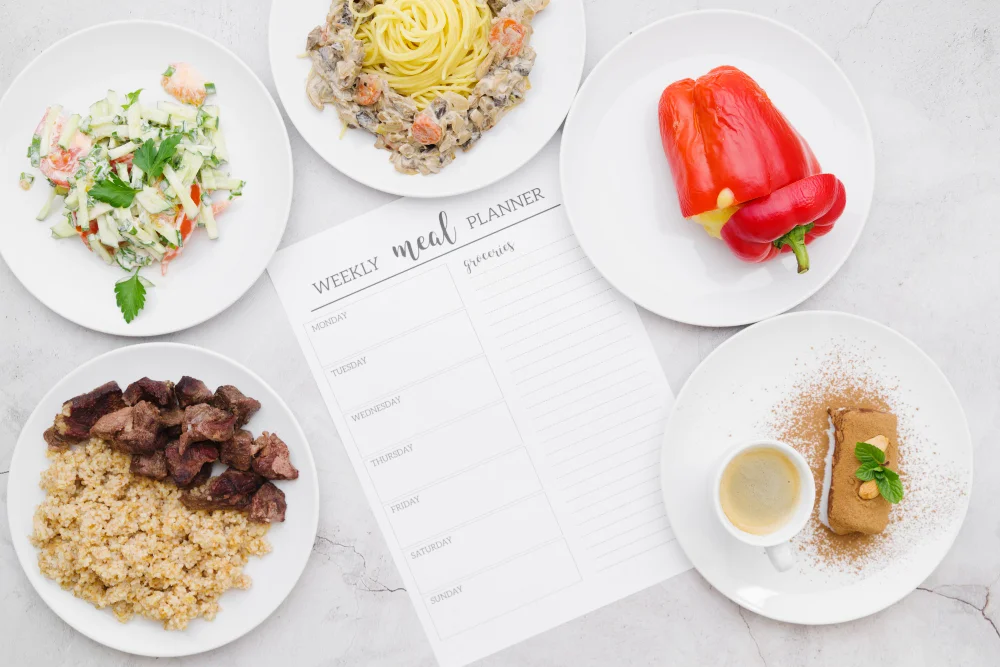Maintaining good health begins with what’s on your plate. A healthy diet meal plan doesn’t mean giving up your favourite foods; it means learning how to balance meals in a way that fuels your body. This guide breaks it all down in a human-friendly, practical way so you can eat better without confusion.
Whether you’re trying to lose weight, increase energy, or simply improve your overall well-being, a well-planned diet can make a significant difference. With the proper structure, you’ll spend less time worrying about food and more time enjoying its benefits.
Why You Need a Healthy Diet Meal Plan
A structured meal plan provides consistency and helps avoid impulsive, unhealthy food choices. It ensures you get the proper nutrients every day without overthinking every bite. More importantly, it helps maintain stable energy levels and supports your long-term goals.
Many people fail in their diet routines because they don’t plan. With a meal plan, your food choices become intentional and deliberate. You begin to understand your hunger cues, improve portion control, and make meals less stressful and more enjoyable.
Healthy Diet Meal Plan Benefits for Everyday Life
Following a healthy diet meal plan helps regulate metabolism, supports better digestion, and keeps your blood sugar levels steady. It’s not just about calories, it’s about getting the right mix of protein, fibre, and healthy fats at every meal.
You’ll also find it easier to:
- Drink more water
- Avoid fast food temptations
- Prepare simple meals at home
- Stick to a grocery list
- Track your progress more efficiently
Weekly Planning for Long-Term Success

Success with healthy eating starts with a smart weekly strategy. Planning your meals ahead of time helps reduce stress, cut food waste, and keep your nutrition on track. Instead of scrambling every day to figure out what to eat, you’ll already have your meals mapped out, saving you time and energy. This also prevents impulsive food choices that may not align with your goals.
Begin by preparing ingredients for the week, such as chopping vegetables, boiling eggs, or cooking grains. Focus on building meals with a variety of colours, each colour adds different nutrients. A good plan includes a substantial breakfast with a balance of protein, complex carbohydrates, and healthy fats, followed by wholesome lunches and dinners that are filling yet not overly heavy.
Easy Meal Ideas for a Healthy Diet Meal Plan
Meal planning doesn’t have to be tedious or complicated. A healthy diet meal plan can include easy recipes that are quick to prepare, full of nutrients, and satisfying for everyone. Whether you’re a busy student, working parent, or just looking to eat better, these simple meal ideas fit right into your routine and help you stay energized all day.
Meal idea
- Breakfast: Overnight oats with chia seeds and berries
- Lunch: Grilled chicken with quinoa and mixed vegetables
- Dinner: Lentil soup with whole grain toast
- Snacks: Apple slices with almond butter, or Greek yoghurt with flaxseeds
- Drinks: Water, herbal teas, or infused lemon water
The Role of Macronutrients in Your Daily Diet
To make your healthy diet meal plan truly effective, it’s essential to balance the three core macronutrients: protein, carbohydrates, and fats. These nutrients are not just about calories; they are necessary for your body to function correctly, recover from physical
activity, and stay energized throughout the day.
Protein builds and repairs tissues while helping you feel full longer. Carbohydrates provide quick and sustained energy, especially for your brain and muscles. Healthy fats support hormone production, nutrient absorption, and cell protection. When these macronutrients are combined wisely in your meals, they promote long-term wellness and steady energy.
How to Adjust Your Healthy Diet Meal Plan Over Time

Your body changes with the seasons, age, and varying activity levels. A flexible diet plan is the most sustainable. Pay attention to how food affects your overall well-being. If something makes you feel sluggish, bloated, or unfocused, adjust your approach accordingly.
Sometimes, you may need more calories; at other times, lighter meals are better. Your plan should reflect your lifestyle, not the other way around. Also, remember to savour your food and make room for treats occasionally.
Building a Budget-Friendly Healthy Diet Meal Plan
Eating healthy doesn’t mean overspending. Focus on whole foods and skip overpriced packaged items. With a bit of preparation, your meals can be affordable and deeply nourishing.
Budget Meal Plan
- Buy seasonal fruits and vegetables
- Choose whole grains in bulk (like brown rice or oats)
- Cook beans, lentils, and legumes at home
- Replace sugary cereals with boiled eggs or porridge
- Make soups, stews, and stir-fries in batches
Mindful Eating Is the Secret Ingredient
No matter how balanced your healthy diet meal plan is, it loses its effectiveness if you’re always eating in a hurry. Mindful eating shifts your focus to the present moment, helping you enjoy your food more and prevent overeating. When you truly savour each bite, you give your body the chance to signal fullness and satisfaction naturally.
Practice eating without distractions, such as phones or TV. Slow down, chew thoroughly, and tune into how your body responds. This builds a healthier relationship with food and improves digestion. Over time, mindful eating becomes second nature, and your meals feel more nourishing, both physically and emotionally.
Conclusion: Your Path to Better Health Starts Today
A healthy diet meal plan is more than just food; it’s a form of self-respect. When you feed your body with care, it responds with better energy, clearer thinking, and emotional balance. It doesn’t require perfection, just intention.
With time, eating well becomes a habit, not a chore. Don’t wait for a “perfect time” to start. Begin with what you have, where you are. Focus on progress, not perfection. Every small, healthy choice adds up.
You deserve to feel good in your body. Start planning your meals today and turn that intention into transformation.










